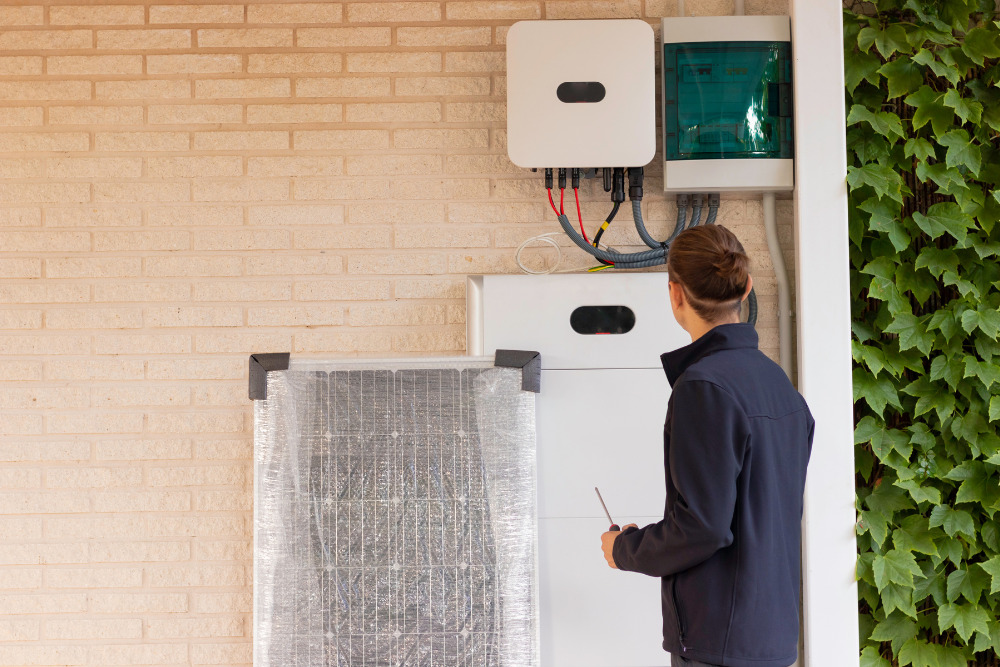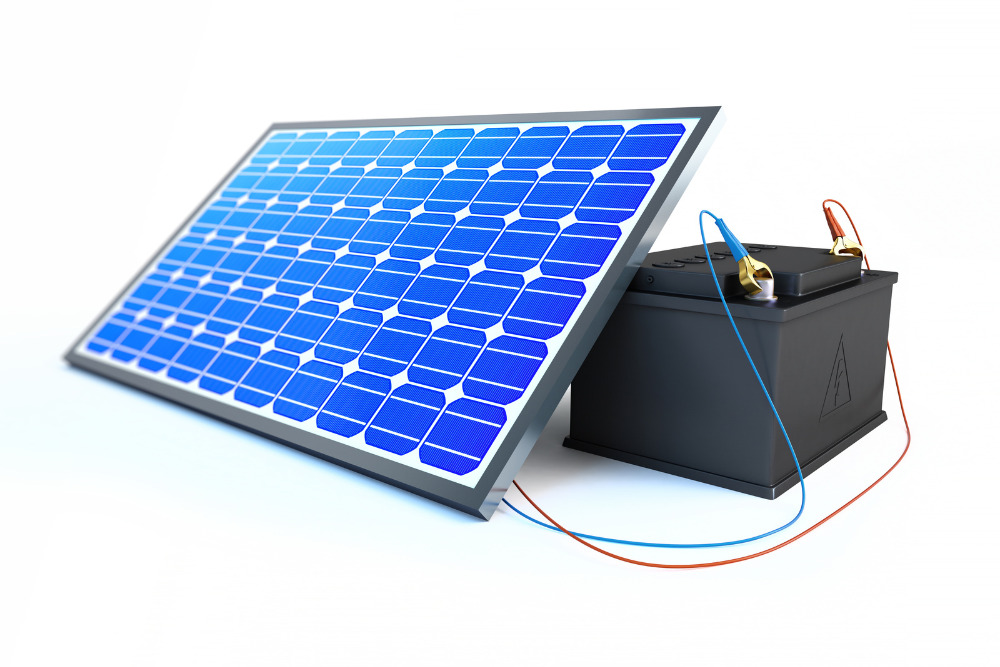
The efficiency of solar battery storage systems varies significantly. Understanding the factors that influence efficiency is important when choosing a solar battery that meets your energy needs and budget.
Solar battery storage involves the capture and retention of excess clean energy generated by solar (photovoltaic) panels for use at a later date. When choosing a solar storage system, it’s important to understand what affects the efficiency of solar battery storage units, and how their conversion rate and maintenance requirements impact system performance.
How Do Solar Batteries Work?
Solar batteries, also known as solar energy storage systems, capture and store the excess electricity solar panels generate.
When sunlight strikes the solar panels, they convert the sunlight into direct current (DC) electricity. As a home draws on the energy, the solar panel system’s inverter converts the electricity into usable AC (alternating current) electricity.
Any energy generated by the solar panels and not immediately used is stored in the solar battery. The stored energy can be used (discharged) during periods of low sunlight or at night when solar panels do not actively generate electricity. This provides a reliable and sustainable, round-the-clock electric source.
What Does Solar Battery Efficiency Mean?
Solar battery storage efficiency refers to how effectively a battery system converts and stores solar energy. It is typically measured as the ratio of the energy stored in the battery to the amount of energy put into it.
Higher efficiency means less energy loss during storage, which increases the usable energy available for later consumption.
What Affects Solar Battery Efficiency?
Several factors influence solar battery efficiency:
Battery Type, Quality, And Size
The quality and type of battery technology used, such as lithium-ion or lead-acid, affects storage and discharge efficiency. The brand, manufacturing standards, and components also affect its performance and efficiency.
Investing in high-quality batteries from reputable manufacturers using higher manufacturing standards and components ensures better efficiency and a longer lifespan.
The size (capacity) of the battery should also be carefully matched to the energy demands of the solar system to avoid overloading or under-utilization.
Charging And Discharging
During charging, the battery must receive a steady and appropriate charging current. Undercharging or overcharging can degrade the battery faster and reduce energy efficiency.
Similarly, during discharging, a well-designed system should produce a smooth and controlled release of stored energy, avoiding sudden spikes or drops in power output.
Charge and discharge management with appropriate charge controllers or energy management systems maintains efficiency and extends the battery's lifespan.
Inverters
The inverter plays a critical role in solar battery efficiency by converting the direct current (DC) electricity stored in the battery into usable alternating current (AC) electricity.
Choosing a high-quality inverter that matches the capacity and specifications of the solar battery system minimizes energy loss during the conversion process.
Round Trip Efficiency
Round trip efficiency refers to how much energy is retained during charging and discharging. It represents the ratio of the energy output during discharge to the energy input during charging, taking into account losses in the conversion and storage processes.
A higher round trip efficiency equates to a more efficient energy storage system.
Environmental Conditions
Temperature, humidity, and sunlight intensity influence the overall performance and lifespan of solar batteries.

How To Make Solar Batteries More Efficient
Investing in high-quality, advanced battery technology is one approach to making solar batteries more efficient. You should also optimize the system design and management to match the battery capacity and charging/discharging profiles with energy demands.
Here are some tips:
Pick A Higher-Quality Battery
High-quality batteries, such as lithium-ion batteries, are much more efficient than older, lead acid batteries. They offer improved charge/discharge efficiency, a longer lifespan, and greater energy density.
Proper Size For Energy Usage
Choosing the proper capacity solar battery system based on energy usage optimizes efficiency and storage.
Oversizing the system can lead to underutilization and unnecessary battery costs, while undersizing may result in insufficient energy storage capacity and potential energy shortages, making a home or business more reliant on the grid.
Maintenance
Regular maintenance is essential to maintain the efficiency of solar batteries. This includes monitoring and balancing the battery cells, checking and cleaning connections, and inspecting for any signs of damage or wear.
Routine maintenance detects any issues so that they can be addressed promptly to maintain system performance and safety.
System Monitoring
By implementing energy management software or remote monitoring tools, you can track the performance of a solar battery system in real-time, detect any anomalies or inefficiencies, and make necessary adjustments to improve efficiency.

Optimizing Time Of Use
By strategically scheduling high-energy-consuming activities during periods of high solar energy generation (i.e. running major appliances during the day when the sun is shining), you get the most out of the stored energy in the evenings and periods of low sunlight. This minimizes grid dependence, improves system efficiency, and leads to greater cost savings.
Frequently Asked Questions About Solar Battery Efficiency
Is Solar Battery Backup Worth It?
Solar battery backup is worthwhile, depending on individual circumstances and priorities. It provides several benefits, including energy independence, resilience during power outages, and potential cost savings through load shifting and peak demand management.
However, the cost-effectiveness and feasibility of solar battery backup depend on energy consumption patterns, local electricity rates, available incentives, and grid reliability in your specific area. While the cost of solar storage is declining along with the rest of the equipment, it’s still a substantial part of a solar system, so budget is a major factor as well.
How Long Do Solar Batteries Last?
The lifespan of solar batteries is connected to the type of battery, depth of discharge, usage patterns, and maintenance.
High-quality solar batteries, such as lithium-ion batteries, generally last anywhere from 10 to 15 years or even longer with proper care. Lead-acid batteries typically have a shorter lifespan of 5 to 10 years.
What Is The Most Efficient Battery For Solar Energy Storage?
Lithium-ion (Li-ion) batteries are widely regarded as the most efficient of solar energy storage technologies for residential and most commercial uses.
They offer high energy density, excellent charge/discharge efficiency, longer cycle life, and low self-discharge rates, making them a preferred choice for solar battery systems.
There are more powerful technologies with greater capacity for utility-scale applications. See more below.
What Is Solar-Plus-Storage?
Solar-plus-storage is another term for a solar battery or solar energy storage system. It’s a system that combines solar panels with battery storage. This allows homeowners and businesses to store excess solar energy for use at night or during times when the sun is not shining.
These systems, typically using lithium-ion batteries, have emerged as highly efficient solutions for solar energy storage at residential and commercial levels.
How Are Solar Batteries Used In Large And Utility Scale Applications?
Storage technology like flow batteries, compressed air, and pumped hydro for large-scale and utility-scale applications are also being explored as efficient and reliable electricity storage solutions.
These systems can store energy in kilowatt-hours (kWh) or even megawatt-hours (MWh), to help large commercial solar arrays and solar power plants balance electricity supply and demand while supporting power grid stability.
To harness the 44 quadrillion watts of power the sun shines on the Earth every year, utility-scale solar now makes up the largest portion of new solar installations every year. In fact, the U.S. could save $5.6 billion and 332 million tonnes of CO2 emissions every year by switching from fossil fuels to solar.
Are There Any Government Incentives For Solar Batteries?
Government incentives, tax credits, and rebates from reputable manufacturers like Tesla, all make solar power and battery energy storage systems more affordable.
Moreover, the continuous advancement of battery technology and declining prices, combined with rising electricity prices, make it a compelling option for home and business owners interested in switching to a source of renewable energy.


